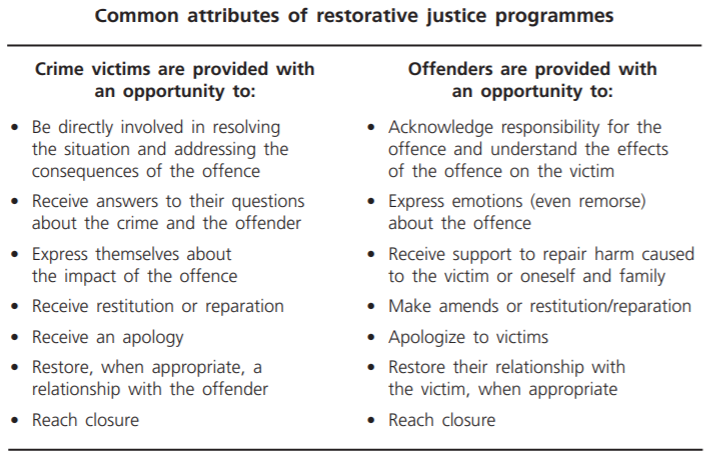Evidence
Maybe you are wondering what the results of restorative justice are. There is strong and consistent evidence that RJ can benefit people harmed by crime.
Researchers have frequently studied the effectiveness of restorative justice practices. They examined how and when the different parties participate, how they experience the process and what the outcomes of the process are.
Victims and offenders want to participate in restorative justice.
Victims want to meet the offenders to ask questions, seek reparations, to heal from the crime and to prevent reoffending. Offenders want to join the process to repair the harm they have caused and to express their remorse. In some cases the offender wants to join to avoid prosecution or a plea deal. The community’s understanding of the crime supports the victim and persuades the offender to take responsibility.
Victims and offenders have a much more satisfactory experience of justice.
As you have read before, restorative processes engage the participation of victims and perpetrators more effectively than the traditional justice system. Victims’ needs and interests are taken into account. Offenders also believe that they are treated more fairly than through traditional justice. Both parties associate restorative justice with fair treatment.
Restorative justice saves money
Restorative justice reduces the costs of reconviction. Victim Offender Mediation takes a third of the time needed for non-mediated cases. Meeting with the offender has been shown to reduce post-traumatic stress symptoms of victims. Moreover, it can have therapeutic benefits for family members of homicide victims. Such long term health benefits can reduce health costs.
Restorative processes result in positive outcomes.
Studies consistently state that restorative processes achieve at least 85% satisfaction among victims and reduce the fear of further harm to the victim. Furthermore, it decreases recidivism of offenders and increases offender compliance with restitution when compared to more traditional criminal justice programmes.
Think about conflicts you have had, are there any situations you’d think restorative justice would have helped you? Why/why not?
In case you can’t come up with a situation, you could also think about conflicts close ones have had. Would restorative justice have been an option for them?
In the following table, the UNODC has listed the benefits both offender and victim can experience from a restorative justice programme.

